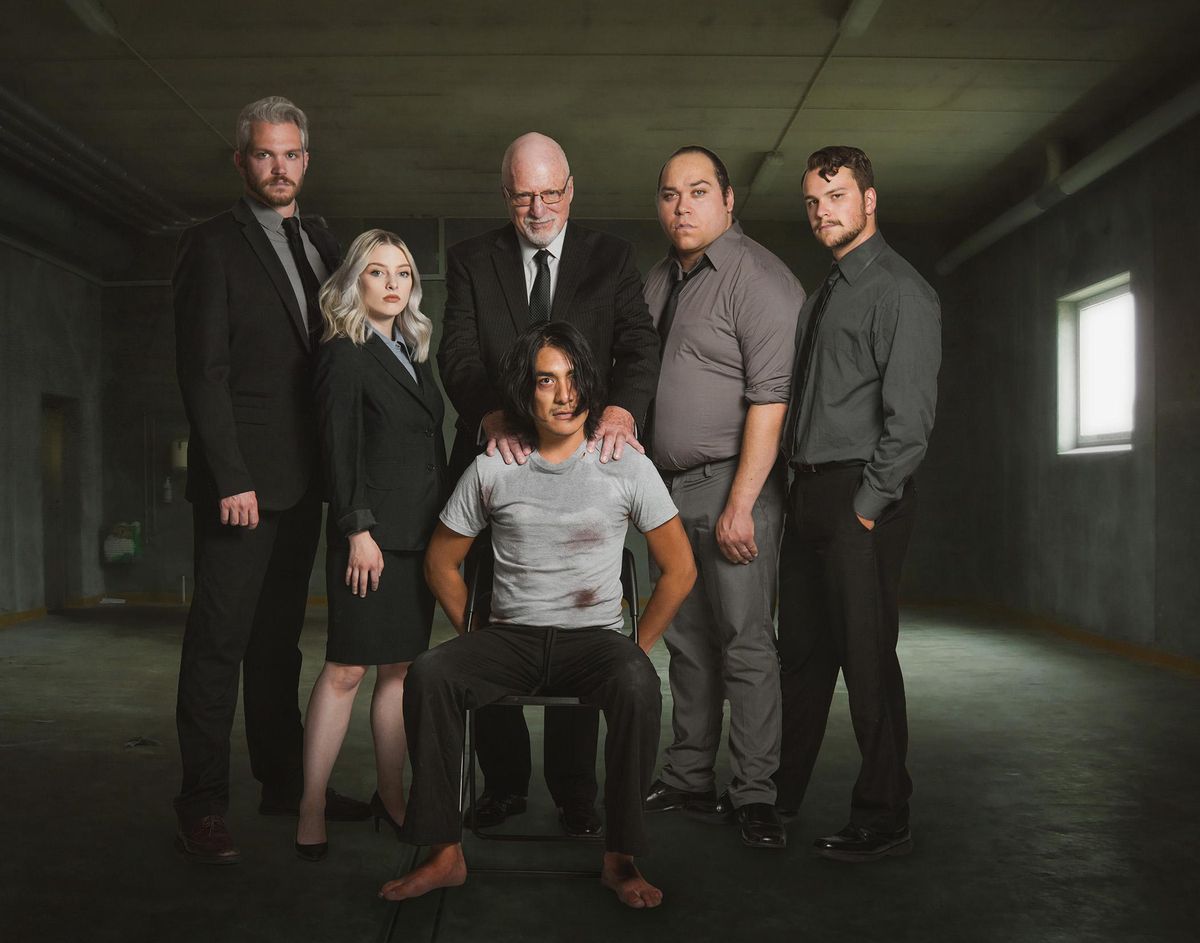Stage Left centers on Winston’s ‘re-education’ in ‘1984’

This week Stage Left opens its run of Michael Gene Sullivan’s theatrical adaptation of George Orwell’s “1984.”
They play chronicles the harrowing everyday life of Winston Smith (Rio Zavala), an outer party member of a dystopian superstate. Winston is a cog in the governing machine that runs “Oceania,” one of three global, unbeatable powers locked in a perpetual war. Winston works for the Ministry of Truth, rewriting state history to fit the party narrative.
The governing principles of Oceania, “War is Peace,” “Freedom is Slavery” and “Ignorance is Strength” subjugate the intellectual population while the uneducated proletariat is neutralized by alcohol, pornography and a lottery that is never paid out. Winston meets Julia (Aubree Peterson), a “rebel from the waist downwards” and O’Brien (JP O’Shaughnessy) a mysterious inner party member. But trust is dangerous in a society where truth is whatever is written down by government officials – like Winston and his colleagues.
Sullivan’s adaptation presents the section of the original storyline during which Winston has been arrested for thoughtcrime and sent to “the Ministry of Love” for re-education. As Winston is forced to relive the events leading up to his arrest on stage, he and his interrogators begin to experience hints of a hidden humanity continuously suppressed by the brutal totalitarian government.
“This version is a bit (different) from all the other ‘1984’ stage productions. It takes place entirely in the Ministry of Love in the basement torture room at the very end of the novel as Winston, the hero of our show, is being tortured for a confession. His confession is the story of ‘1984,’” said show director Chris Wooley. “Using that one setting and that one room, his confessions bring out the whole plot of the story.”
Winston is tortured and interrogated by four “party members,” played by Dahveed Bullis, Aubree Peterson, Kyle Ross and Herron Davidson. . The four actors are responsible for acting out the interrogation but they are also responsible for reenacting the events of Winston’s confessions as he gives them. One takes on the role of Winston, one Julia and the others take on various other roles as the story unfolds.
“It’s a little bit confusing but once you see it, it makes perfect sense,” Wooley admitted as he went on to explain some of the challenges of the production.
“It’s been exciting as we’ve experimented with the blocking and the messages that are coming through the show. Our lead actor is somewhat physically limited because (his character is) shackled to a wall or strapped to a chair or otherwise has limited mobility,” said Wooley. “It puts a lot of pressure on other cast members to make it visually interesting for the audience as well as getting the story told.”
The showrunners decided to downplay the more technological aspects of the original story, opting instead to focus in on the deeper human issues. To this end, the set is predominantly gray, the wardrobe palette is very muted, the props are minimal and for the most part mimed. In the same vein, the usual “telescreen” representation of Big Brother has also been replaced by an eye-shaped surveillance device.
For two weeks leading up to the start of rehearsals, Wooley and the cast undertook an in-depth analysis of the novel to better understand their journey.
“Everybody in the show has a really solid foundation of what ‘1984’ is about and the social and political influences that came from it. I thought it was important that we start with that and really understand why we’re in that situation and how it’s relevant to today,” Wooley said. “So that while we’re trying to process these things we’re a little bit more understanding as the actor.”
This is a dark play based on a dark novel. Wooley and the cast expressed how the heavy subject matter can take a real toll.
“By the time the show ends we’re always tear-filled,” said Bullis, who plays one of the interrogators and reenacts the confessions from Winston’s point of view.
Wooley added, “It is a very emotionally draining show. We have to end every rehearsal with a giant group hug and a couple minutes of breathing and relaxation to get out of the heavy mindset of the space of having just been torturing somebody or being shackled down or all the other violence that’s happening. It’s not as brutal as the Broadway version that’s going around. With that one they get pretty graphic. This one is mostly psychological but still, it’s quite intense for the actors.
“We have to have that kind of cool down right afterwards. We really needed a strategy to make sure that we were taking care of our actors as people while still telling the story.”
Though the show seems decidedly bleak until this point, Wooley insists, “there is a balance in the show.”
“It does have a powerful message. It’s intense for the audience to see,” said Wooley. “You’re not going to go home singing or tap dancing any showtunes but you will be having some interesting dinner conversations.”